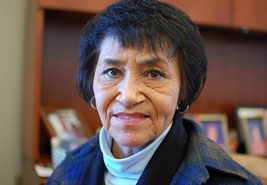
By Dan Gunderson, Minnesota Public Radio
MOORHEAD, Minn. — White Earth Band of Ojibwe tribal members have approved a new constitution that dramatically changes tribal government and expands membership in Minnesota’s largest Chippewa tribe.
The new constitution eliminates the blood quantum which requires a person to prove they have 25 percent Indian blood and changes to a system based on family lineage. But choosing a new constitution is only the first step in what will likely be a long and challenging process.
White Earth Nation Chairwoman Erma Vizenor has advocated for constitutional reform for 16 years, and said Tuesday that when 79 percent of voters approve a new constitution, as they just did with 3,492 votes cast, it’s a transformational moment.
“It feels great. It is gratifying to know that the people of White Earth have spoken and spoken strongly,” Vizenor said.
White Earth’s government will also expand. The new constitution replaces the five-member Reservation Business Council with independent executive, legislative and judicial branches.
The new separation of powers will help create economic stability on the northern Minnesota reservation, Vizenor said. “If we look at all the research on economic development in Indian Country, to diversify the economics of the reservation is dependent on an independent judicial system.”
But first, White Earth needs to resolve a conflict its new constitution sets up with the Minnesota Chippewa Tribe which is the governing body of six bands. The Red Lake Nation is independent of the MCT.
White Earth Constitutional Reform Manager Terry Janis says negotiations with the Minnesota Chippewa Tribe will take time.
“There’s some significant differences between the current MCT structure and this new proposed constitution and so they’re going to have to engage a process with MCT to figure out how they’re going to resolve those differences to allow White Earth to remain a part of MCT,” Janis said. If those differences can’t be resolved, White Earth would need to decide if it will withdraw from the MCT. The issue will be discussed at a Minnesota Chippewa Tribe meeting next month.
Vizenor said she’s confident an agreement can be reached because the numbers are on the White Earth band’s side: Its members make up more than half of the Minnesota Chippewa Tribe.
Once membership in the MCT is resolved, White Earth will schedule an election for a president, members of the legislative council and a chief judge. Those new elected officials will then create the laws that define the new government roles based on the new constitution.
That might well be a process fraught with challenge according to James Mills, a consultant who helps tribes across the country with constitutional reform. He has not worked with White Earth, but said he’s helped about 50 tribes write or amend constitutions. In his experience, reform sometimes creates a power struggle.
“When someone writes a constitution that divides the powers between the three branches, if they’re not clear about who does what and when, the executive and legislative will often argue over whose authority it is and I’ve seen them just become stagnant as a result,” Mills said.
Vizenor said she knows the path forward is filled with challenges, but she says tribal members have given a mandate for change and she expects the transition to be successful.
How long that transition will take is unclear. Vizenor says she hopes new elections can be held within a year.
EDITOR’S NOTE: An earlier version of this story incorrectly reported that the Minnesota Chippewa Tribe governs all of the Minnesota Chippewa bands. The Red Lake Nation is independent of the Minnesota Chippewa Tribe. The current version of this story is correct.
